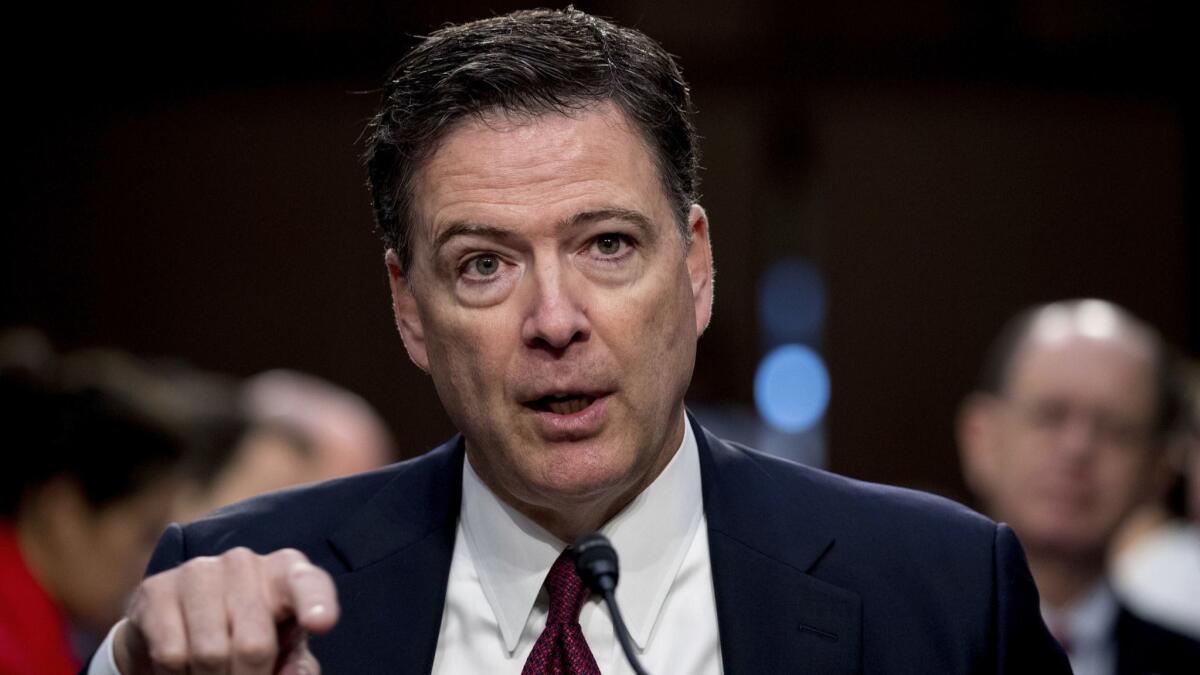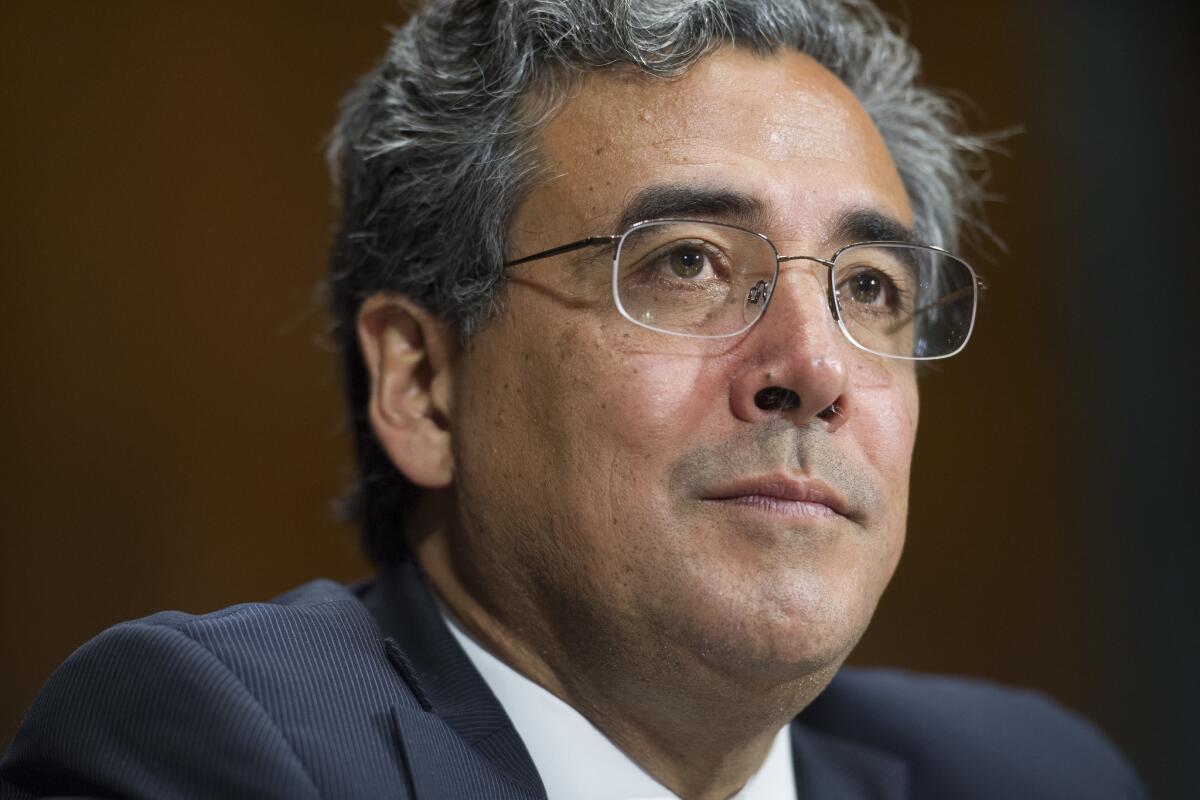Rod Rosenstein, Justice Department official overseeing the Russia investigation, will stay — for now

Rod Rosenstein, the top deputy to Atty. Gen. Jeff Sessions, has been a target of persistent attacks from congressional Republicans over his role in overseeing special counsel Robert S. Mueller III’s investigation.
- Share via
Reporting from Washington — Deputy Atty. Gen. Rod Rosenstein stepped into his government SUV on Monday morning for the short ride from the Justice Department to the White House, where he was convinced he was about to be fired.
Just three days earlier, the New York Times reported that Rosenstein, who supervises the high-stakes Russia investigation, had suggested secretly recording President Trump or even finding a way to remove him from office last year.
Although Rosenstein adamantly and publicly denied it, the next day he spoke with White House Chief of Staff John F. Kelly about his tenure as the Justice Department’s second-in-command.
Now, as he made his way up rain-slicked Pennsylvania Avenue, cable news and social media were erupting with reports that Rosenstein had offered his resignation and expected to be ousted — potentially throwing the special counsel investigation into turmoil as it racks up indictment after indictment of former Trump aides and others.
But after meeting again with Kelly, Rosenstein wasn’t fired. Nor did he quit. By early Monday afternoon, he had returned in his SUV to his office, his job intact. The White House said Rosenstein would meet with Trump on Thursday when the president returns from attending the United Nations General Assembly in New York.
The episode left a cloud of confusion over the future of a veteran federal prosecutor who has spent his career shying from the spotlight only to find himself trapped in the glare of Washington’s political crucible.
Follow live coverage of the Trump administration »
In addition to supervising day-to-day operations of the 100,000-employee Justice Department, Rosenstein oversees special counsel Robert S. Mueller III’s investigation into whether anyone from Trump’s team conspired with Russians during the presidential campaign, making him a frequent target of Republican fury.
Replacing Rosenstein would not automatically derail Mueller’s work. But it could provide Trump an avenue to constrict the investigation or even bring it to a close if he can find a more compliant official to supervise the special counsel.
Rosenstein has repeatedly defended Mueller’s work against Trump’s outbursts that it is a politically motivated “witch hunt.”
Administration officials declined to say what transpired in Rosenstein’s meeting with Kelly. Nor did they elaborate on the “extended conversation” that the White House says Rosenstein had with Trump on Monday.
“We will be determining what to do,” said Trump, who has been unusually measured in his comments about Rosenstein in recent days. “I spoke with Rod today and we’ll see what happens.”
Friends of Rosenstein, who was U.S. attorney in Baltimore before Trump nominated him last year to help lead the Justice Department, said he was prepared for whatever came next.
“He’s a very fatalistic kind of person. He has no illusions that these positions last forever,” said James Trusty, a former federal prosecutor who has known Rosenstein for nearly two decades.
Trusty, now a partner at Ifrah Law, said Rosenstein “tends to put his head down and say: ‘I’m going to keep doing the job right. And the day they tell me I don’t work here anymore is the day I stop.’”
Rosenstein began supervising the Russia investigation after Atty. Gen. Jeff Sessions, who campaigned for Trump, recused himself in March 2017. Two months later, when Trump abruptly fired James B. Comey as FBI director, Rosenstein appointed Mueller as special counsel.
Those chaotic days have been the source of controversies that continue to shadow Rosenstein.
It was during that time, according to media reports Friday, that he suggested secretly recording the president or removing him from office using the 25th Amendment.
The 25th Amendment allows the vice president and a majority of Cabinet secretaries to declare that a president is “unable to discharge the powers and duties of his office,” starting a process that would ultimately require two-thirds votes in the House and Senate.
Rosenstein has denied the reports. “I never pursued or authorized recording the president and any suggestion that I have ever advocated for the removal of the president is absolutely false,” he said in a statement on Friday.

Rosenstein had little public profile until May 2017, when he was asked to lay out a case for firing Comey.
In a lengthy letter, Rosenstein sharply criticized Comey for his handling of the FBI investigation into Hillary Clinton’s use of a private email server when she was secretary of State. The White House initially cited the letter to explain why Trump had abruptly dismissed Comey.
But Trump later said he had already decided to fire Comey before asking for Rosenstein’s letter, citing his displeasure with “this Russia thing.”
That put Rosenstein into an untenable position and raised questions about whether Trump was improperly trying to shut down or influence a federal investigation.
Days later, Rosenstein appointed Mueller as special counsel, a decision that infuriated the president because it ensured the wide-ranging investigation would continue to cast a cloud over the White House.
It also left Rosenstein in the political hot seat as the investigation continued and expanded to include questions about whether Trump obstructed justice by trying to influence the inquiry.
“He was someone who did not seek the limelight whatsoever,” said Douglas Gansler, a former state attorney general in Maryland who worked alongside Rosenstein there. “Nor does he seem to enjoy it.”
So far, Mueller’s team has obtained criminal charges against 32 people, although no Americans have been charged with conspiring with Russians.
Four defendants have pleaded guilty to lying to investigators, including former national security advisor Michael Flynn, former campaign foreign policy advisor George Papadopoulos and former deputy campaign chairman Richard Gates, who also admitted to a charge of conspiracy.

Trump’s former campaign chairman, Paul Manafort, was convicted of tax evasion and bank fraud in August after a trial in Alexandria, Va. He later cut a deal with prosecutors, pleading guilty and agreeing to cooperate to avoid a second trial in Washington.
In addition, 25 Russians were indicted for their alleged role in Moscow’s covert campaign to boost Trump in the presidential election, but are outside the reach of U.S. courts.
Rosenstein has staunchly defended Mueller’s work, telling Congress in December that the special counsel was handling the sensitive case “appropriately.” He also vowed to resist an improper order to fire him.
At various stages, Rosenstein has made decisions that have angered the president.
For example, he approved Mueller’s decision to refer information about Michael Cohen, Trump’s former lawyer in New York, to federal prosecutors in Manhattan.
Cohen has since pleaded guilty to bank fraud, tax evasion and campaign finance violations. He told the court that Trump directed him, shortly before the election, to make hush-money payments to two women who said they had slept with him years ago.
If Rosenstein departs, his authority over the special counsel’s office would probably pass to the next most senior Justice Department official confirmed by the Senate, Noel Francisco, the solicitor general, who was confirmed in September 2017 by a vote of 50 to 47.
Francisco served under President George W. Bush, first in the White House and then in the Justice Department, from 2001 to 2005. He then joined Jones Day, a prominent Washington law firm and headed its government regulation practice before Trump chose him last year.
Twitter: @chrismegerian
UPDATES:
4:05 p.m.: The article was updated with additional details about Rosenstein’s meetings.
10:15 a.m.: The article was updated with the White House announcement that President Trump will meet with Rosenstein on Thursday.
9:30 a.m.: The article was updated with additional details about Rosenstein’s meetings at the White House.
The article was originally published at 8:15 a.m.
More to Read
Get the L.A. Times Politics newsletter
Deeply reported insights into legislation, politics and policy from Sacramento, Washington and beyond. In your inbox twice per week.
You may occasionally receive promotional content from the Los Angeles Times.











